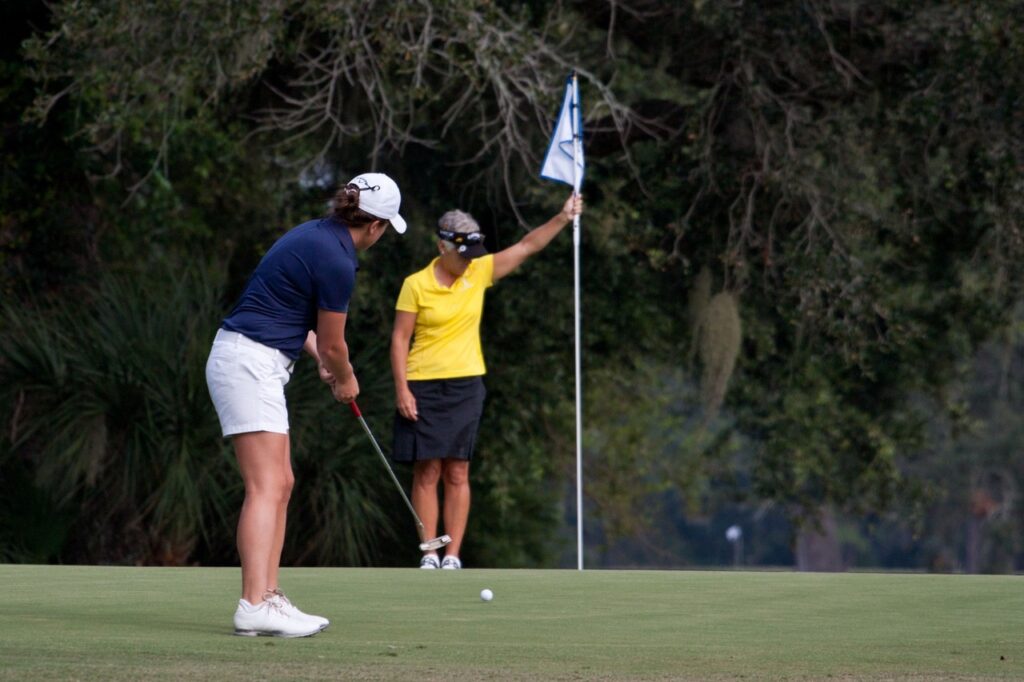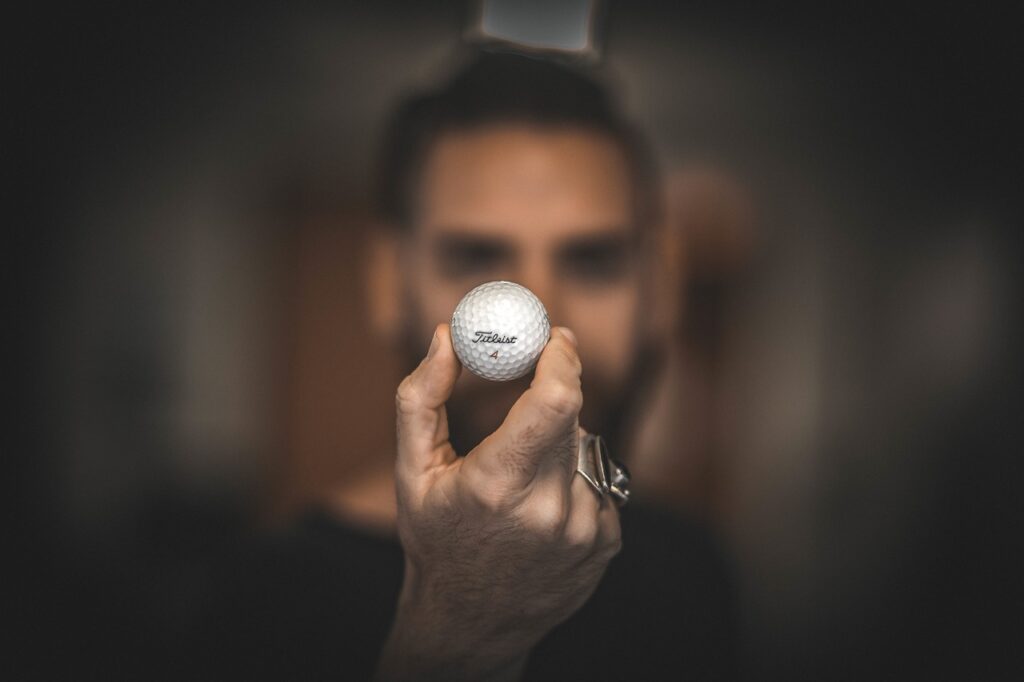Hablar de golf es hablar de uno de los deportes más exigentes con sus jugadores.
Según los expertos, seguido del tenis y del portero de fútbol, pero encabeza la lista sin lugar a dudas.
Y no es solo por la gran destreza y habilidad que son necesarias para poder destacar, sino porque el factor psicológico es el gran protagonista.
No permite bajar la guardia.
Y no hablamos solo de la competición, se mantiene presente desde sus etapas iniciales, cuando se está aprendiendo, y hasta en un partido informal con amigos.
Cada golpe, cada elección de palo, cada posición, requieren de una alta concentración, en la que no puedes dejar que intervenga nada más que el juego, ese momento, esa bola.
Y no, no es nada fácil.
Puede parecer exagerado, porque un juego dura un total de entre tres y cuatro horas, pero solo se dedican unos minutos al golpe de las bolas.
No obstante, el tiempo que transcurre entre ellos exige una alta concentración para analizar la posición, distancia y análisis de las siguientes acciones.
Y esto distingue al golf de otras prácticas deportivas, porque en ellas, la competición, a pesar de que exige altas dosis de concentración y atención, ayuda a liberar tensión.
El golf se salta esta norma, y exige una precisión mental y emocional, tanto en la ejecución como en la preparación del swing.
También entre golpe y golpe.
Se puede tener un nivel altísimo de técnica, pero si no se acompaña de una gestión emocional adecuada, no hay nada que hacer.
Para poder rendir al 100% en este deporte, hay que tener claro que el estado de ánimo es decisivo.
Por todos estos motivos, la psicología se convierte en el factor clave de este deporte.
Tips for not losing your swing.
To be able to control your golf, you have to work on each of the aspects that make up a great player.
Surely you are committed to two of them: technique and physique.
An athlete who wants to be at his or her best must have healthy habits, control his or her diet, rest, prepare physically and master technique, strokes, position…
But there is a fundamental part, the one that brings us here today: The psychological aspect.
That mental disposition that makes you not care if you make three bad shots and get the ball into the fairway, or have a very easy putt and get it off the green.
Why would you keep on trying?
Because you have a mental predisposition that helps you to see beyond to analyse the mistake so that you don’t make it again, not to stick to it.
And here we bring you today a series of tips to train that winner’s mentality that will make you unstoppable.
The first of these is about concentration.
Maybe other sports allow it, but not golf. You must not lose focus of what you are doing, think about the next shot, the technical skills.
The ability to concentrate is also trained and the more experience you have, the better results you will get.
But being on target is not the only thing that will help you.
Sometimes nerves can play tricks on us and this makes us lose focus.
In this situation, the only thing that will have saved us is training.
Repeat the same strokes over and over again, until you feel you have mastered them.
If you have practised the same shot hundreds of times, the day you play it in a tournament, without even noticing it, you will be more relaxed, you will know how to position yourself and the exact swing.
When you train, imagine that you are competing and visualise a tournament.
Set specific goals for yourself.
Don’t say “I need to improve my drive”.
Identify what exactly you need to improve and set a strategy to work on it.
If you do this, you will get to the point and be more effective.
The fact that this is a very solitary sport, which requires a lot of physical mobility in order to compete can also have an influence on the psychological side.
This common environment can have consequences on an emotional level and that is why you will have to rely on the team that accompanies you.
The caddie is more than an advisor in the game.
He or she is the most important person you have close to you and must be more than just your companion. The person you trust, who advises you and helps you. The closest thing to a psychologist.
Ideally with him or her, although it can also be by yourself, you should establish a psychological strategy. This means defining some actions that can help you relax or motivate you. Talking, taking a walk, analysing the game you have played….
Being resilient will also help you.
Be aware that it is not a bed of roses that there is a lot of work ahead and make this a motivation, a constant desire to improve.
To shine in golf, the preparation has to be complete and this involves several aspects.
We already know that technique is important, but even more important if possible is the psychological training, because it depends on the latter that you will be able to take your performance to the highest level.
Learn to manage your feelings, your emotions and how to react to each situation.

Controlling your emotions, the key to success in golf.
In the end, emotions are the answer and the greatest tool within your reach.
The biggest challenge is knowing how to control them because that is the difference between them being your greatest ally or your worst enemy.
The first thing is to be clear about your goals, where you can get to and the process you have to set yourself to achieve them.
Self-confidence is the basis of every athlete.
And it is the tool that requires the most stability to keep you there.
There are some aspects that don’t need to be worked on or don’t need as much attention from you.
Talent is something innate, you either have it or you don’t. Experience comes with experience, you gain experience over the years, every game, every tournament and your progress grow over time.
But confidence in yourself is a daily job.
Always remember who you are, why you do this, what you feel when you finish a game in which you have done your best and achieved your goals.
And that confidence is what will give you a sense of control.
It doesn’t mean that you see the path as clear and don’t understand the difficulty.
It is just the opposite.
Knowing what you’re up against, seeing the obstacles but not letting them paralyse you.
It’s about understanding your real chances of winning (or not), enjoying the journey and applying your technique to achieve your goals.
When you achieve stability in your confidence, you have a good base to work on the psychological aspect of golf.
How can you know if you have an optimal psychological preparation?
When you don’t slip.
The answer is motivation.
A round of golf can last between 3 and 4 hours. In that time, thousands of thoughts, ideas and memories run through your mind.
Mastering and controlling them is part of your preparation, being able to maintain a stable and serene state of mind.
This translates into a linear game, where enthusiasm is maintained and performance does not drop.
It may not be your best day, either because of the game itself or external factors but if you have worked on this aspect well, you will be able to stay focused on your game and put everything else aside.
When you manage to stay that way, your confidence doesn’t fade.
The negative is counterproductive, it is a conversation with yourself that should lead to the correct management of the situation to look for solutions and not difficulties.
The moment you turn the tables and start to reflect positive ideas in your mind, you acquire a sense of responsibility for your game, clarity in your decisions and a vision of the field and what you have to do.
Being committed to your goal and your goals will help you maintain that mindset.
One trick to be able to guide your thoughts towards positivity is to stop thinking about the mistake you have made or usually make and start thinking about what you want to do, what is the trajectory the ball should follow to put it right where you need it to be.
If you concentrate on where you don’t want it to go, you will surely send it there.
Work on this way of thinking, reinforce your positive thinking and you will soon see results in your game.
Breathing will help you the most to control your nerves and relax your muscles.
There are many exercises to learn how to breathe properly.
Diaphragmatic breathing is done in three phases: breathe in (you fill the lower part of your lungs first, then the middle part and finish by filling the upper part), hold your breath in for a few seconds before breathing out as slowly as you can.
If you practice it for a while every day, eventually your body will do it automatically.
Do this before you start playing and any time you feel rushed or feel that your nerves are starting to overwhelm you.
Slow breathing helps you to oxygenate your muscles better and that also pays off.
Muscle relaxation is synonymous with coordination, precision, efficiency… Tension is synonymous with poor coordination, clumsiness, inaccuracies, mistakes…
Learn to breathe and relax and nerves will never again make you send a ball out of bounds.
Play hole by hole is another trick to keep a cool head. Play and manage each shot. Was it bad? Then leave it there, move on to the next.
Was it a good shot? Use it to fill you with confidence and move on but don’t over do it, it can have the opposite effect
What you should never do is let a bad shot or a hole that has gotten out of hand, affect your mentality.
The game is very long and you can go through many moments.
You are going to make mistakes.
Many times.
In golf it’s very easy, as we’ve said before.
How you handle mistakes and the frustration they generate will tell you if you are using them in the right way.
Every mistake leads you to improve, to strive and work to find that perfect shot.
If they cause you to get angry or focus on the fear of repeating them again, you will be wasting every opportunity that happens.
Use every bad shot and bad decision to redirect your game.
If you are in this sport or any other, one of your qualities is, for sure, being competitive.
Living it in a way that will help you improve your performance, set your goals and areas for improvement and create a plan to make it all happen.
Competing should make you a better player.
If you approach it the wrong way, you will create unnecessary pressure that will cause you to make more mistakes, become demotivated and lose that confidence you have worked so hard for.
Being competitive is important for your swing.
But if there’s one thing we have to keep in mind, we have to ask: what do you have to do above all else to be a great golfer?
It’s enjoy it.
Flow, feel the game, connect with the ball.
Work all of this into your training so that the day you get on the course you enjoy yourself, you have a motivating experience with all your faults and your successes.
When you manage to do all this, you will focus on the game, your brain will be concentrated without you being very aware of it and all the psychological work you have done will be reflected in the result.
The best of all is that neither this sport, nor the recommendations we have brought you today, are intended only for professionals.
Psychological training is something that everyone should practice, from the amateur to the world number one.
You play your best game and you already have all the tools you need to develop it. All you have to do is work at it.
Little by little, day by day, you will see results.
You have the only key to take your game to its highest level.


